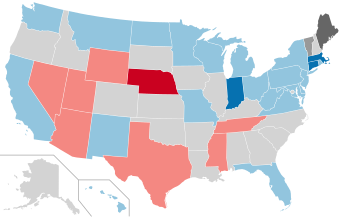
Back ھەڵبژاردنی ئەنجومەنی پیرانی ئەمریکا (٢٠١٢) CKB Wahlen zum Senat der Vereinigten Staaten 2012 German Εκλογές της Γερουσίας των Ηνωμένων Πολιτειών 2012 Greek Elecciones al Senado de los Estados Unidos de 2012 Spanish Élections sénatoriales américaines de 2012 French 2012년 미국 상원의원 선거 Korean Eleição para o Senado dos Estados Unidos em 2012 Portuguese Выборы в Сенат США (2012) Russian
| |||||||||||||||||||||||||||||||||||||||||||||||||||||||||||||||||||||||
33 of the 100 seats in the United States Senate 51 seats needed for a majority | |||||||||||||||||||||||||||||||||||||||||||||||||||||||||||||||||||||||
|---|---|---|---|---|---|---|---|---|---|---|---|---|---|---|---|---|---|---|---|---|---|---|---|---|---|---|---|---|---|---|---|---|---|---|---|---|---|---|---|---|---|---|---|---|---|---|---|---|---|---|---|---|---|---|---|---|---|---|---|---|---|---|---|---|---|---|---|---|---|---|---|
| |||||||||||||||||||||||||||||||||||||||||||||||||||||||||||||||||||||||
 Results of the elections: Democratic gain Republican gain Independent gain Democratic hold Republican hold Independent hold No election | |||||||||||||||||||||||||||||||||||||||||||||||||||||||||||||||||||||||
| |||||||||||||||||||||||||||||||||||||||||||||||||||||||||||||||||||||||
The 2012 United States Senate elections were held on November 6, 2012, with 33 of the 100 seats in the Senate, all Class 1 seats, being contested in regular elections whose winners would serve 6-year terms beginning January 3, 2013, with the 113th Congress. Democrats had 21 seats up for election, plus 1 Independent, and 1 Independent Democrat, while the Republicans only had 10 seats up for election. The presidential election, elections to the House of Representatives, elections for governors in 14 states and territories, and many state and local elections were also held on the same day.
The Democrats gained Republican-held seats in Massachusetts and Indiana and one from an Independent Democrat in Connecticut, leaving them with a total of 53 seats. Additionally, they held open seats in Hawaii, New Mexico, North Dakota, Virginia, and Wisconsin. The Republicans, despite losing 2 of their seats, picked an open seat in Nebraska up and retained open seats in Arizona and Texas, ending with a total of 45 seats. The Independents retained a seat in Vermont and gained an additional seat from the Republicans in Maine, bringing their total to 2 seats. Both Independents would caucus with the Democrats, forming a majority caucus with a combined total of 55 seats.
As of 2024[update], this was the last time the Democrats won seats in Florida, Indiana, Missouri, and North Dakota. It was also the last time the Republican Party won a seat in Nevada. The Democrats would not win control of the Senate again until 2020[c] and would not win an outright majority again until 2022.
Additionally, this was the first time since 1936 that a 2-term Democratic presidential candidate had Senate coattails on both occasions. (Although Franklin Roosevelt won third and fourth terms in 1940 and 1944, respectively, he lost Senate seats on both occasions.) This was also the first time since 1964 in which either party had to defend more than two-thirds of the Senate seats up for grabs but managed to make net gains.[2][3] As of 2024[update], this is the last election cycle in which an incumbent senator lost renomination (Richard Lugar of Indiana).
- ^ a b c Cite error: The named reference
Clerk new formatwas invoked but never defined (see the help page). - ^ Weisman, Jonathan (November 6, 2012). "Democrats Keep Control of the Senate". The New York Times.
- ^ Bendavid, Naftali (November 6, 2012). "Democrats Retain Control of U.S. Senate". The Wall Street Journal.
Cite error: There are <ref group=lower-alpha> tags or {{efn}} templates on this page, but the references will not show without a {{reflist|group=lower-alpha}} template or {{notelist}} template (see the help page).

